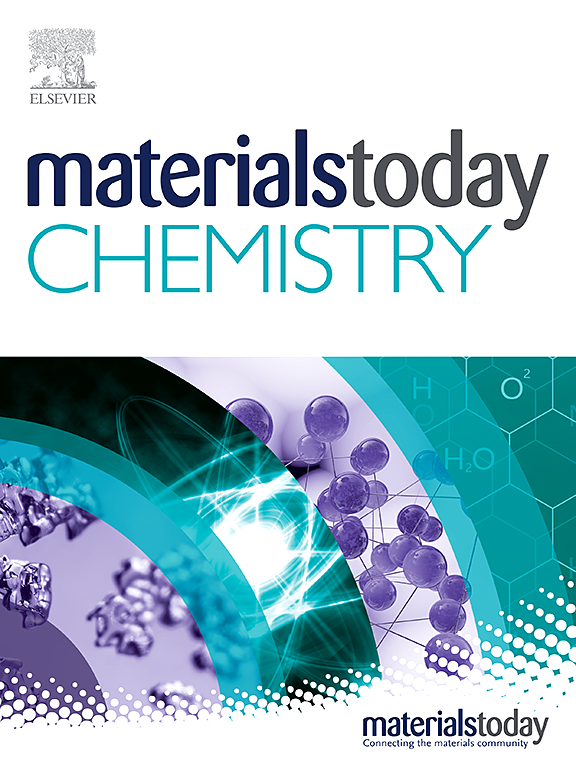金-多巴胺集成聚己内酯基二维质子纳米纤维双模平台,用于协同增强外周神经病变和卓越的癌症治疗技术
IF 6.7
2区 化学
Q1 CHEMISTRY, MULTIDISCIPLINARY
引用次数: 0
摘要
在此,我们采用一步电纺丝法制备了由核壳金-PDA 和 PCL 组成的双功能二维对齐 PCL@Au-PDA 纳米纤维杂化支架。36 nm 大小的 AuNPs 与 15 nm 的 PDA 外壳进行了表面功能化,得到了 1.5 mg 和 3.0 mg 两种浓度的 Au-PDA,均匀地分散在 PCL 中,具有独特的拓扑、生物特性和潜在的协同作用。此外,PCL@Au-PDA 还为 PC-12 的细胞粘附、神经生长、增殖和分化提供了特殊的细胞外基质(ECM),并对 S-42 细胞具有高亲和力。基因表达分析(qRT-PCR)显示,Actin beta、TREK-1 和 MAP2 的表达水平明显提高,这进一步意味着细胞迁移、增殖、成熟和分化能力增强。与纯 PCL 相比,PCL@Au-PDA 的神经元长度增加了 2.2 倍以上。此外,PCL@Au-PDA 还表现出卓越的光热效率,在 0.5 W/cm 的近红外激光功率下,5.0 分钟内可消融 95.23% 的 MCF-7 细胞。AuNPs 表面 15 nm 的 PDA 涂层放大了 PCL@Au-PDA 的光热效应,加速了光能向热能的转化,从而刺激了人乳腺癌细胞的破坏。FACS 分析显示,PCL@Au-PDA 对 MCF-7 细胞的凋亡率为 69.67%,而纯 PCL 的凋亡率仅为 7.93%。PCL@Au-PDA 纳米纤维可作为一种极具前景的生物活性材料用于乳腺癌光疗,也可作为一种生物植入物用于乳房再生后的感觉恢复。本文章由计算机程序翻译,如有差异,请以英文原文为准。
Au-Polydopamine integrated polycaprolactone-based 2D plasmonic nanofibrous bimodal platform for synergistically enhanced peripheral neuropathy and superior cancer theranostics
Herein, we report bifunctional 2D aligned PCL@Au-PDA nanofibrous hybrid scaffolds composed of core-shell Au-PDA and PCL were prepared using a facile one-step electrospinning method. 36 nm sized AuNPs were surface functionalized with a 15 nm shell of PDA and resulted in Au-PDA with two concentrations of 1.5 mg and 3.0 mg uniformly dispersed in PCL that provided unique topological, biological properties and potential synergistic outcomes. Besides, PCL@Au-PDA provides exceptional extracellular matrix (ECM) for cell adhesion, nerve growth, proliferation, and differentiation of PC-12 and high affinity to S-42 cells. The gene expression analysis (qRT-PCR) showed a significantly increased expression level of the Actin beta, TREK-1, and MAP2 which further implied enhanced cell migration, proliferation, maturation, and differentiation. There was more than a 2.2-fold increase in the neurite length with PCL@Au-PDA as compared to pure PCL. Also, PCL@Au-PDA showed excellent photothermal efficiency and was found to ablate 95.23 % MCF-7 cells in 5.0 min at 0.5 W/cm of NIR laser power. The 15 nm PDA surface coating on AuNPs amplifies the photothermal effect of PCL@Au-PDA and accelerates the conversion of light energy to heat energy which stimulates the destruction of human breast cancer cells. FACS analysis showed the apoptotic percentages for MCF-7 cells at 69.67 % with PCL@Au-PDA whereas for pure PCL only 7.93 % were recorded which suggested that the superior plasmonic photothermal efficacy of PCL@Au-PDA even at low power density. PCL@Au-PDA nanofibers could be a highly promising bioactive material for breast cancer phototherapy and a possible bioimplant for sensation restoration after breast regeneration.
求助全文
通过发布文献求助,成功后即可免费获取论文全文。
去求助
来源期刊

Materials Today Chemistry
Multiple-
CiteScore
8.90
自引率
6.80%
发文量
596
审稿时长
33 days
期刊介绍:
Materials Today Chemistry is a multi-disciplinary journal dedicated to all facets of materials chemistry.
This field represents one of the fastest-growing areas of science, involving the application of chemistry-based techniques to the study of materials. It encompasses materials synthesis and behavior, as well as the intricate relationships between material structure and properties at the atomic and molecular scale. Materials Today Chemistry serves as a high-impact platform for discussing research that propels the field forward through groundbreaking discoveries and innovative techniques.
 求助内容:
求助内容: 应助结果提醒方式:
应助结果提醒方式:


